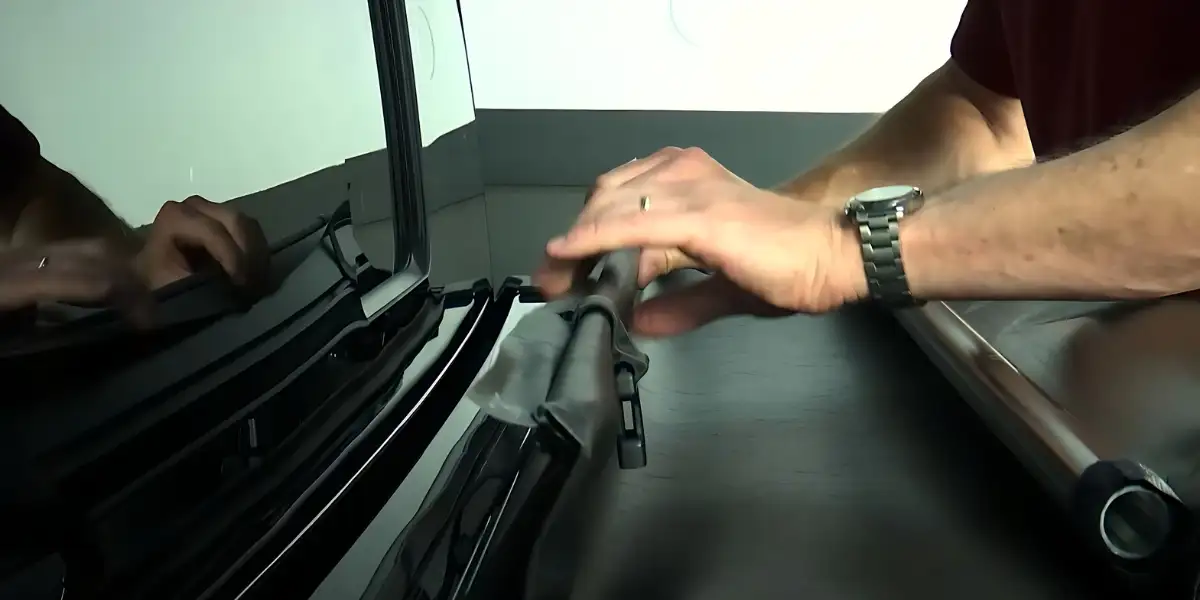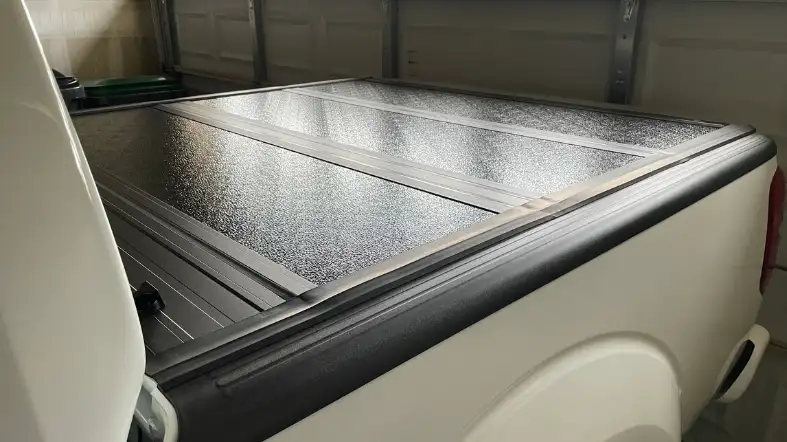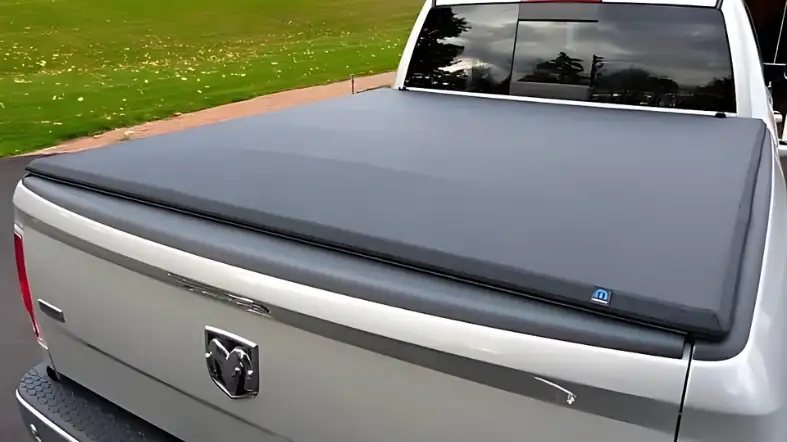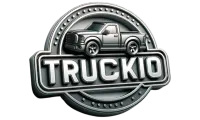Looking for a solution to minimize the noise from your tonneau cover? Wondering if there are ways to enjoy a quieter driving experience?
Today we’ll explore the noise factors associated with tonneau covers and provide practical tips to reduce or eliminate those annoying sounds.

Are Tonneau Covers Noisy?
Yes, poorly fitting tonneau covers can be noisy. They may rattle, whistle, and shake while driving, which can be annoying and potentially damage both the cover and the truck.
Why Do Some Tonneau Covers Make Noise?
Loose Parts
When tonneau covers aren’t attached properly, they can become loose and create noise.
Latches, hinges, or fasteners might loosen over time because of vibrations or regular use.
This can result in rattling or clanking sounds while driving. To fix this, make sure all the parts are tightened correctly and regularly check for any signs of looseness.
Flapping in Wind
If a tonneau cover isn’t tightly sealed or has gaps around the edges, it can flap and make noise when the vehicle is moving.
When wind passes through these gaps, it causes the cover to vibrate and produce an irritating sound.
To prevent this, ensure the cover is properly aligned and securely fastened. You can also use weather stripping or foam tape to seal any gaps or openings.
Material Quality
The type and quality of material used in tonneau covers can contribute to noise issues.
Thin or low-quality materials may flap, rattle, or create a humming sound while driving.
To reduce noise, choose covers made from strong and durable materials like fiberglass or heavy-duty vinyl.
Water Accumulation
Tonneau covers that don’t drain water effectively can contribute to noise problems.
Water collecting on the cover’s surface while driving can create splashing or sloshing sounds, especially during turns or sudden movements.
Choose covers with built-in drainage systems or ensure that water is properly drained before hitting the road.
Bedliner Compatibility
Some tonneau covers may not work well with certain bed liners, resulting in noise issues.
If the cover doesn’t fit properly or makes contact with the bedliner, it can cause rubbing or scraping sounds.
Before purchasing a tonneau cover, check if it’s compatible with your bedliner type. Make any necessary adjustments or modifications to minimize noise.
Improper Installation
Incorrect installation is a common cause of tonneau cover noise.
If the cover isn’t installed according to the manufacturer’s instructions, it can lead to unnecessary noise while driving.
Make sure to carefully follow the installation process, ensuring all steps are done correctly, and all parts are securely fastened.
Wear and Tear
As tonneau covers age, they may experience wear and tear, leading to noise problems.
Components such as hinges, latches, or seals can deteriorate, causing increased movement and noise.
Regularly inspect your tonneau cover for any signs of damage or wear.
Replace any worn-out parts to maintain optimal performance and minimize noise.
What Are The Different Types Of Noises Associated With Tonneau Covers?

Rattle
Tonneau covers can rattle if they’re not securely attached or have loose parts like latches, hinges, or fasteners.
This happens because the cover moves while you drive, creating vibrations and a rattling sound.
To fix this, make sure all the parts are tightly secured and regularly check for looseness.
Flapping
Flapping is another noise associated with tonneau covers. It occurs when the cover isn’t sealed properly or has gaps around the edges.
Wind passing through these gaps causes the cover to vibrate and make a flapping sound,
It happens especially at higher speeds or in windy conditions. To reduce this noise, align and seal the cover correctly.
You can also use weather stripping or foam tape to close any gaps or openings.
Whistling sound
Tonneau covers may produce a whistling sound, like blowing air through a small opening.
This happens because of aerodynamic factors that disrupt the airflow. Look for tonneau covers designed to minimize wind noise and drag.
Covers with sleek, low-profile designs are less likely to cause whistling sounds.
Squeaking
Squeaking can occur when tonneau covers rub against the truck bed or when different parts of the cover rub together.
Regular use, lack of lubrication, or wear and tear can contribute to squeaking.
To address this, apply lubricant to the hinges, latches, or moving parts of the cover periodically.
Banging or clanking
Banging or clanking sounds may happen if tonneau covers have loose or worn-out parts like latches or fasteners.
Over time, these parts may wear down or become loose, resulting in more movement and noise.
Check the cover for damage or wear and replace any worn-out parts. Make sure all the components are tightly secured and properly aligned.
Can Noise From Tonneau Covers Be Reduced Or Eliminated?

Check for Loose Parts
Look for any loose latches, hinges, or fasteners on your tonneau cover. If you find any, use the right tools to tighten them securely.
This simple action can significantly reduce rattling noises caused by loose components.
Ensure Proper Installation
Make sure you install your tonneau cover correctly according to the manufacturer’s instructions.
Incorrect installation can create gaps or misalignment, leading to flapping or whistling noises.
Double-check the installation and adjust it as needed for a proper fit.
Seal Gaps and Edges
If your tonneau cover has gaps or openings that let wind pass through, it can cause flapping or whistling noises.
Consider using weather stripping or foam tape to seal these gaps and create a tighter seal. This will help minimize noise caused by airflow.
Lubricate Moving Parts
Squeaking noises can happen when the moving parts of your tonneau cover rub against each other.
Apply a suitable lubricant to hinges, latches, or any other components causing the noise.
Regular lubrication can reduce friction and eliminate squeaking sounds.
Choose an Aerodynamic Design
When selecting a tonneau cover, look for models specifically designed to minimize noise.
Covers with sleek, low-profile designs are often more aerodynamic and can help reduce wind resistance and associated noises like whistling.
The research covers engineered for noise reduction.
Regular Maintenance
Perform regular maintenance on your tonneau cover to keep it in optimal condition. Check for any signs of damage, wear, or loose parts.
Promptly replace any worn-out components or damaged sections. By maintaining your tonneau cover, you can minimize the chances of noise issues.
5 Tips to Choose a Tonneau Cover That Doesn’t Make Noise
Consider the Material
Opt for tonneau covers made from high-quality and durable materials like fiberglass or heavy-duty vinyl.
These materials are less likely to create noise compared to thinner or lower-quality options.
Sturdy materials can withstand wind and road conditions, minimizing vibrations and associated noise.
Look for Aerodynamic Designs
Choose tonneau covers with sleek and aerodynamic designs. These designs are specifically engineered to reduce wind resistance and minimize noise.
Covers with low-profile structures are less likely to cause turbulence or airflow disruptions, resulting in a quieter driving experience.
Check for Secure Fastening
Ensure the tonneau cover you choose has a secure and reliable fastening mechanism.
Look for covers with sturdy latches, hinges, or fasteners that keep the cover tightly secured.
A properly fastened cover minimizes movement and vibrations, reducing the likelihood of noise.
Research Noise-Reduction Features:
Some tonneau covers come with noise-reduction features built into their design. These may include foam seals, weather-stripping, or other innovative technologies.
It can help create a tight seal and reduce noise caused by wind or vibrations.
Research different models to find ones that specifically address noise reduction.
Read Customer Reviews
Before making a final decision, read customer reviews and ratings of the tonneau cover you are considering.
Look for feedback specifically related to noise levels and vibrations.
Real-life experiences shared by other users can provide valuable insights into the noise performance of different tonneau covers.
Can Tonneau Covers Shrink and Become Noisy?
Tonneau cover shrinkage causes and solutions can vary depending on the material used. In colder climates, vinyl covers might contract, causing potential noise and fit issues. However, proper installation and regular maintenance can minimize shrinkage problems. For instance, ensuring proper tension and using conditioner can help maintain the cover’s size and prevent noise concerns.
Frequently Asked Questions
What Causes Noise In Tonneau Covers?
Noise in tonneau covers can be caused by loose parts, improper installation, gaps or openings, aerodynamic factors, or friction between moving parts.
Identifying the specific cause can help in addressing the noise issue.
Can I Reduce Tonneau Cover Noise?
Yes, you can reduce tonneau cover noise by ensuring secure fastening, sealing gaps, lubricating moving parts, choosing an aerodynamic design, and performing regular maintenance.
How Can I Secure A Tonneau Cover To Reduce Noise?
To secure a tonneau cover, make sure all the parts are tightly fastened.
Check for loose latches, hinges, or fasteners and tighten them securely. This can help minimize rattling or banging noises.
Will An Aerodynamic Tonneau Cover Be Quieter?
Yes, an aerodynamic tonneau cover with a sleek and low-profile design is likely to be quieter.
These designs reduce wind resistance and turbulence, minimizing noise caused by airflow.
Can I Eliminate Noise From My Tonneau Cover?
While it may not be possible to completely eliminate all noise, you can significantly reduce tonneau cover noise by choosing the right cover, maintaining it properly, and addressing any loose parts or gaps.
Final Words
Transform your driving experience with a noise-free tonneau cover.
You can enjoy a quieter ride by addressing loose parts, ensuring proper installation, sealing gaps, and selecting an aerodynamic design.
Regular maintenance and choosing a cover with noise-reducing features are key.
